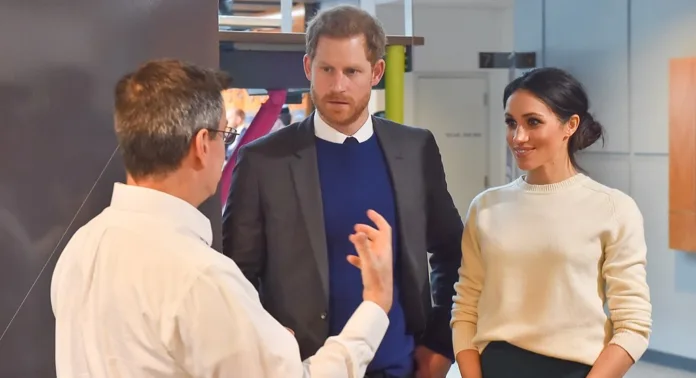Meghan Markle and Prince Harry’s visit to Nigeria sparks controversy as royal commentators criticize their actions and speeches
Prince Harry faced harsh criticism during his recent visit to Nigeria with Meghan Markle. The couple, who visited to promote the Invictus Games, were accused of acting as if they were still working royals. Royal pundit Maureen Callahan criticized Harry for “standing at attention” during the national anthem while inspecting troops at the Nigerian Defence Headquarters in Abuja. Callahan argued that Harry’s actions further diminished his standing.
Harry and Meghan stepped down as working royals in 2020, losing several royal roles. Callahan emphasized the absurdity of Harry’s actions, noting he no longer holds his military honours. She suggested Harry and Meghan were “playing as though they’re still royals,” which she found contradictory given their past criticisms of royal life.
Embed from Getty ImagesOn the trip, Meghan shared an anecdote about her daughter, Princess Lilibet, which also drew criticism. Speaking at Lightway Academy in Abuja, Meghan recounted a conversation with her daughter, sparking scepticism from royal watchers. Meghan quoted Lilibet saying, “Mama, I see me in you,” which Callahan dismissed as improbable given Lilibet’s young age.
Harry inspecting troops in Nigeria, despite being stripped of his military titles, stirred controversy on social media. Critics labelled his actions “cringy” and questioned the legitimacy of the couple’s visit. Some commentators suggested Harry and Meghan’s behaviour implied they were on a royal tour, despite no longer holding such status.
Not everyone criticized Harry’s actions, however. Some supporters appreciated the couple’s visit and the warm reception they received in Nigeria. Harry’s military service, including two tours in Afghanistan, and his former military titles were acknowledged by fans who felt his actions during the visit were appropriate.
Despite the mixed reactions, the scrutiny of Harry and Meghan’s trip highlights the ongoing public and media interest in their activities post-Megxit. The couple continues to navigate their new roles and public perception, balancing their philanthropic efforts with the criticisms they face from both supporters and detractors of the monarchy.
The controversy surrounding Harry’s actions in Nigeria reflects broader tensions about the couple’s identity and public image. Their decision to step back from royal duties and the subsequent fallout continue to shape their public engagements and the reactions they receive.
In-depth Analysis
The criticism Prince Harry faced for inspecting troops during his visit to Nigeria underscores the complex dynamics at play in his and Meghan Markle’s public life. From a political perspective, Harry’s actions can be seen as a subtle assertion of his identity and previous roles, despite his official departure from royal duties. This act may have been intended to honour his military background and show respect for the Nigerian Defense Forces, yet it clashed with the public’s perception of his current status.
Sociologically, the scrutiny Harry and Meghan face reflects the broader public’s difficulty in reconciling their past royal roles with their new, independent identities. The public and media continue to hold them to standards set by their former royal positions, creating a tension between expectation and reality. This tension is evident in the mixed reactions to their visit and the ongoing debate about their relevance and authenticity in their new roles.
Economically, the couple’s visit to Nigeria and the associated controversy have implications for their brand and financial ventures. Their public image directly influences their marketability and the success of their projects, such as the Invictus Games. Negative publicity can impact their ability to attract sponsorships and support for their initiatives. Therefore, managing their public persona is crucial for their economic sustainability.
From a local perspective, Harry and Meghan’s visit to Nigeria had the potential to bring positive attention to local causes and foster goodwill. However, the criticism they faced may have overshadowed the positive aspects of their visit. The reception in Nigeria, both positive and critical, highlights the importance of understanding and respecting local contexts and perceptions when engaging in international activities.
Gender dynamics also play a role in the scrutiny Meghan faces. Her anecdote about Lilibet was met with scepticism, reflecting a broader pattern of questioning the authenticity and intentions of women in public roles. Meghan’s experiences highlight the unique challenges women, particularly those in high-profile positions, face in balancing personal and public narratives.
Race and minority perspectives are crucial in understanding the couple’s experiences post-Megxit. Harry and Meghan have been vocal about the racial discrimination they faced within the royal family and the media. Their visit to Nigeria, a predominantly black nation, carries symbolic weight. However, the criticism they faced suggests that their efforts to connect with minority communities are still met with significant scrutiny and scepticism.
In summary, the reactions to Harry and Meghan’s visit to Nigeria reveal the complex interplay of political, sociological, economic, local, gender, and racial factors that shape their public image and the ongoing discourse around their roles and actions post-Megxit.
